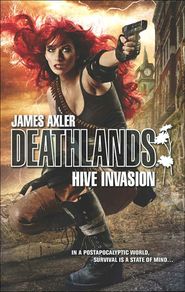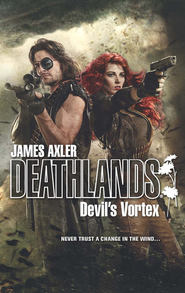По всем вопросам обращайтесь на: info@litportal.ru
(©) 2003-2024.
✖
Forbidden Trespass
Настройки чтения
Размер шрифта
Высота строк
Поля
“Mildred, the way our asses are dragging, we’d be in double-deep shit if we ran into any of the shadowy bastards. If Jak couldn’t follow their tracks in the daylight, we bastard sure aren’t turning up anything now.”
He straightened and stretched.
“Tomorrow,” he said.
Chapter Four (#ulink_c45440f6-93f6-503f-bdc5-48eacc513a92)
“What a mess,” Mathus Conn said, shaking his head.
The ruins of the Berdone house still smoldered, drooling dirty brown smoke into a mostly cloudless blue morning sky. The sweetish smell of overcooked meat spoiled the freshness of a new day’s air. It even overpowered the stink of still-burning wood.
“You didn’t expect it to be pretty, did you?” his cousin and chief lieutenant, Nancy, said.
He grunted and rubbed his chin. “Just funny how it always turns out worse than you expect.”
“I always hear tell of how your imagination makes things worse than they really are,” Tarley Gaines said. “But then the reality usually sucks harder.”
The three, along with a few of Tarley’s kinfolk and half a dozen or so well-disposed or just curious ville folk from Sinkhole, had trekked out to the Berdone location to see for themselves what could be learned from the site. It was clear that Wymie had been telling the truth.
At least so far as she knew it.
“So who set the house afire, I wonder,” Conn said.
“Don’t see as we’ll ever know for sure,” Nancy replied. “Mebbe the outlanders did it. Mebbe Wymie did it in hopes of trappin’ some of whoever chilled her family inside.”
“Speaking of which,” Tarley said. “Yo, Zedd. Find any chills in there?”
“Two,” came back the voice of one of his nephews from inside the gutted house. Like many established homes in the Pennyrile, the outer walls were stoutly built of fieldstone, not scraped-together scavvy and newly sawn lumber the way villes like Sinkhole tended to be. Wymie’s great-grandfather, a man remembered only as “Ax,” had built the house with the help of his sons, after setting up a successful wood-cutting claim in the area.
And now it’s gone to ruin overnight, Conn thought, shaking his head.
“Reckon we’d best go see for ourselves,” he said.
* * *
“NUKE THAT MATHUS CONN!” Wymie exclaimed, slamming her fist on the breakfast table in the boarding house Widow Oakey ran. The assorted crockery clattered and tinkled. “I can’t believe he stuck up for those outlanders like that!”
“Now, Wymie,” the widow said, tottering in from the kitchen holding a steaming pot of spearmint tea on a battered tray. “You got no call to be pounding around raising a fuss like that.”
Wymie judged the old lady had to have seen her. She was deaf as a rock, unless you hollered in her face. At that there was no telling how much was lip-reading rather than any kind of hearing.
Widow Oakey was a tiny woman, who seemed to consist entirely of a collection of dried hardwood sticks bundled up in what had most likely started its existence as a gingham dress, but now seemed mostly made up of roughly equal amounts of soaked-in seasoned sweat and patches, all topped off by a bun of yellowish white hair. She seemed frail and so bound by arthritis and rheumatism that her joints barely functioned at all. Yet Wymie knew she chipped her own kindling like a pro, and her cooking was better than passable good.
It was her housekeeping that fell by the wayside.
“Why are you wishin’ death and devastation on Conn?” asked Garl, one of her fellow lodgers, from across the table. A few fragments of scrambled egg dribbled from the side of his mouth and cascaded down his several chins toward his belly, which kept him so far back from the table his comically short-seeming arms had trouble reaching his plate. He looked as if he went straight from being a baby to being a vast, gnarled, weathered, grizzly baby, without passing through the intervening stages of childhood and adulthood.
“How dare he stick up for outlanders who chilled my baby sister?” she asked hotly. “Cannie coldhearts. The worst thing! Worse than muties, even! I saw it with my own eyes!”
“Now, are you sayin’ you saw them all in the act of chilling your sister, Wymie?” the other boarder at breakfast asked. “Because that sounds double crowded to me. They’d all be gettin’ in each other’s way. Not to make light of a terrible thing, or nothin’. Still, it don’t seem practical.”
Duggur Doakz was a middle-aged black man with a fringe of gray hair and not a tooth in his head. A gifted silversmith, he could have been a rich man—an important tradesman to some important baron. But that would take him far off beyond Pennyrile, and he hadn’t chosen to leave the place where he was born. He kept his hand in and his body out of the ground by being a tinker and general repairman.
Wymie scowled furiously into her own plate. It was bare except for a few crumbs of biscuit and near-invisible scraps of egg. She had eaten like a ravenous wolf. She had a hearty appetite at the best of times. For some reason the onset of the worst had made her even hungrier.
Or mebbe it’s because I ain’t et since yesterday, she thought.
A cat jumped as if on cue onto Wymie’s shoulder. She started to swat it off, but refrained. She was a guest in the oldie’s house, after all. And her pa had seen her raised right as to politeness to one’s elders. She in turn had passed that on after he died to— Her eyes drowned in hot, stinging tears.
The cat jumped to the floor, then rubbed against her leg and purred.
Wymie didn’t like cats. She couldn’t trust a creature that looked only after its own interests and never after hers. But Widow Oakey’s rickety-seeming predark two-story house was overrun with the wretches. Mebbe a dozen of them.
The whole place reeked of cat piss and shit, which at least kept down the smell of dust and mold. The house was a crazy quilt of scavvy furniture, decorations and irregularly shaped lace doilies apparently made by Widow Oakey herself, without apparent skill, and strewed haphazardly over chairs, tables and bric-a-brac alike to protect them from…something.
“I saw one of them,” she muttered fiercely. “The mutie. I saw the white skin and white hair, plain as day. And the eyes. Those red eyes…”
“Now, now, Wymie,” Duggur said. “Albinos aren’t hardly muties.”
She raised clenched fists. But becoming vaguely aware of Widow Oakey hovering fragilely nearby with her tray trembling precariously in her hands, she refrained from smashing them down on the piss- and grease-stained white damask tablecloth.
Someone knocked on the front door. Widow Oakey set down the tray, spilling about half a cup of tea out the spout of the cracked pot. She tottered off to answer.
Before Wymie could reach for the spoon to ladle out a second helping of eggs, she came back with a trio of locals.
Her cousin Mance Kobelin immediately came to her, spreading his arms. She rose to join in a wordless embrace. She felt the tears run freely down her face, moistening the red plaid flannel of his shirt beneath her cheek.
“We heard what happened, Wymie,” intoned Dorden Fitzyoo, hat in hand, as Mance released her. He had doffed it per Widow Oakey’s stringent house rules, revealing a hair-fringed dome of skull that showed skating highlights in the morning sun as filtered through dusty, fly-crap-stained chintz curtains. “It’s a terrible thing.”
Wymie nodded thanks, unable to speak. Dorden, who made and milled black powder on the far side of Sinkhole, had been a close friend of Wymie’s mother and father. He had been driven somewhat apart from the family after Tyler Berdone’s accident. Like so many others. Wymie still thought of him as a kindly uncle.
He had already sweated through the vest, which didn’t match the suit coat he wore over it, straining to contain his paunch. “What happened to your parents, then, child?” the third visitor said in a cracked and quavering voice. “We heard they’re dead too.”
“They got chilled,” she said.
“Ah. How horrible that you had to witness that.” He shook his wrinkled head, which showed even more bald skin that Dorden’s though, as if to compensate, his hair stuck out in wild white wings to both sides. “Only the good die young.”
So long as you’re talking about Blinda, she thought. I wonder if you’d say that if you knew how often Mord talked about grabbing you some dark night and hanging you over a fire till you spilled the location of that fabled stash of yours.
But Wymie’s stepdad had never acted on his gruesome fantasy, and never would’ve. Though this man’s hands shook like leaves in a brisk breeze most of the time, they steadied right down when he gripped a hammer or other tool. Or a handblaster. He was still the best shot for miles around with his giant old Peacemaker .45 revolver.
Wymie had a hard time believing the stories that oldie Vin Bertolli had been the western Pennyrile’s biggest lady-killer in his prime. But that was decades ago: he had lived in and around Sinkhole for over half a century, since arriving as a young adventurer in his twenties who’d been forced to seek a quiet place to settle by a blaster wound that’d crippled his left hip some.
“The outlanders did it,” Wymie said. “I saw the white face and red eyes of the murdering son of a bitch myself. I could almost reach out and touch him! But that taint Conn sticks up for them!”
“You got to do somethin’ yourself then, Wymie,” Mance suggested. “I’ll help.”
“Obliged,” she said.











